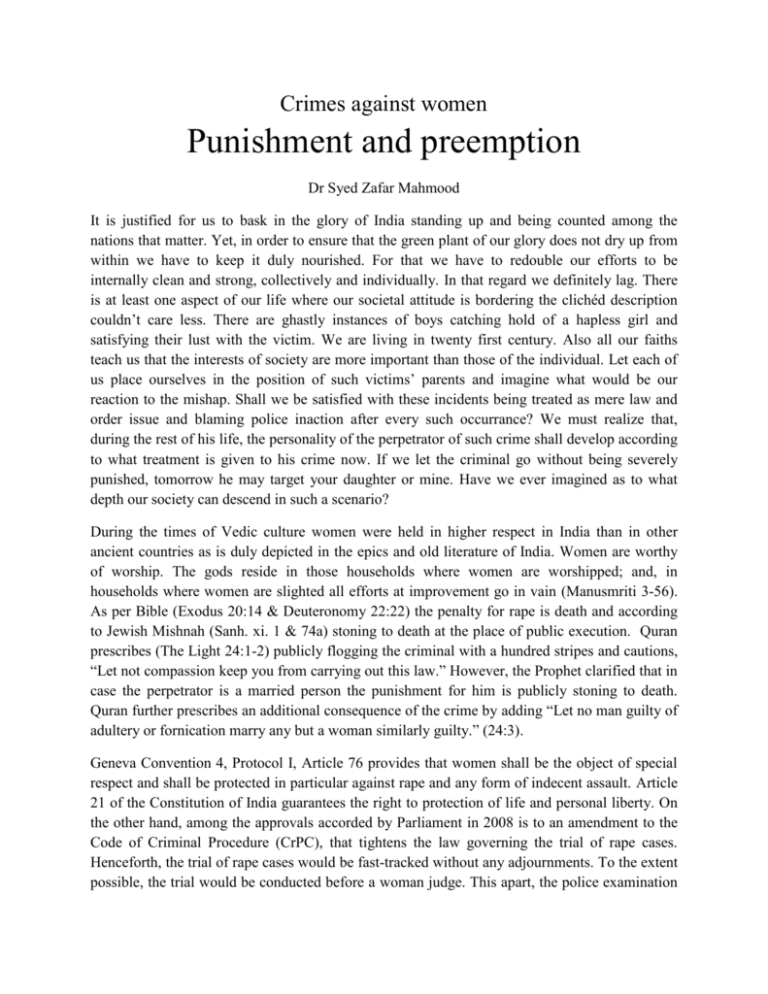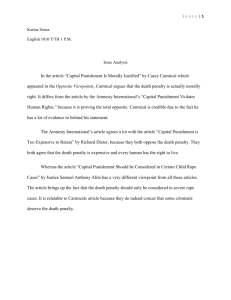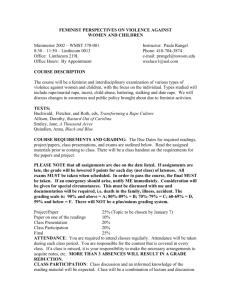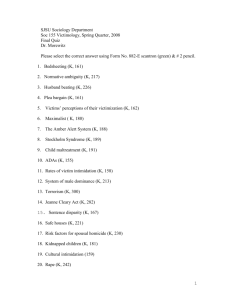Crimes Against Women - Punishment and Preemption
advertisement

Crimes against women Punishment and preemption Dr Syed Zafar Mahmood It is justified for us to bask in the glory of India standing up and being counted among the nations that matter. Yet, in order to ensure that the green plant of our glory does not dry up from within we have to keep it duly nourished. For that we have to redouble our efforts to be internally clean and strong, collectively and individually. In that regard we definitely lag. There is at least one aspect of our life where our societal attitude is bordering the clichéd description couldn’t care less. There are ghastly instances of boys catching hold of a hapless girl and satisfying their lust with the victim. We are living in twenty first century. Also all our faiths teach us that the interests of society are more important than those of the individual. Let each of us place ourselves in the position of such victims’ parents and imagine what would be our reaction to the mishap. Shall we be satisfied with these incidents being treated as mere law and order issue and blaming police inaction after every such occurrance? We must realize that, during the rest of his life, the personality of the perpetrator of such crime shall develop according to what treatment is given to his crime now. If we let the criminal go without being severely punished, tomorrow he may target your daughter or mine. Have we ever imagined as to what depth our society can descend in such a scenario? During the times of Vedic culture women were held in higher respect in India than in other ancient countries as is duly depicted in the epics and old literature of India. Women are worthy of worship. The gods reside in those households where women are worshipped; and, in households where women are slighted all efforts at improvement go in vain (Manusmriti 3-56). As per Bible (Exodus 20:14 & Deuteronomy 22:22) the penalty for rape is death and according to Jewish Mishnah (Sanh. xi. 1 & 74a) stoning to death at the place of public execution. Quran prescribes (The Light 24:1-2) publicly flogging the criminal with a hundred stripes and cautions, “Let not compassion keep you from carrying out this law.” However, the Prophet clarified that in case the perpetrator is a married person the punishment for him is publicly stoning to death. Quran further prescribes an additional consequence of the crime by adding “Let no man guilty of adultery or fornication marry any but a woman similarly guilty.” (24:3). Geneva Convention 4, Protocol I, Article 76 provides that women shall be the object of special respect and shall be protected in particular against rape and any form of indecent assault. Article 21 of the Constitution of India guarantees the right to protection of life and personal liberty. On the other hand, among the approvals accorded by Parliament in 2008 is to an amendment to the Code of Criminal Procedure (CrPC), that tightens the law governing the trial of rape cases. Henceforth, the trial of rape cases would be fast-tracked without any adjournments. To the extent possible, the trial would be conducted before a woman judge. This apart, the police examination of a victim would be conducted at either her residence or that of her parents or at any other place of her choice. The aim is to make the law more humane for victims and more stringent for the offenders. Even in cases where the accused sexually harasses or insults the modesty of a woman by way of either obscene acts or songs or by means of words, gesture, or acts intended to insult the modesty of a woman, he is punishable under Sections 294 and 509 of Indian Penal Code (IPC). When a woman is ravished, as per Justice Krishna Aiyer, what is inflicted is not mere physical injury but the deep sense of some deathless shame… human response cannot be blunted by people’s habit to take life easy. Against the backdrop of so comprehensive and profuse a mandate against women being subjected to indecent behavior, why are we still sitting in our respective cozy environs without moving an eyelid against what is going on in the street around us. The upcoming generations will not forgive our inaction nor will God ignore our act of omission. God says in the scripture that man and woman are garments for each other. At the same time He chose to make woman the weaker gender. Are we the men doing our duty to the women? I am afraid, not. Let us get up and resort to vigilantism before this crime becomes an epidemic. Let some of us form ourselves into a task force for preemptive protection of women at different levels. We have to keep our eyes and ears open all the time. We have to forecast situations and take advance action. We have to organize periodical group discussions and lectures on the duties of man and woman towards each other. We have to keep reminding the children of their duty toward the society. Let us insist that an unmarried perpetrator of rape can marry only a proved adulteress. We must not be myopic in this regard. That would be counter-productive. For that, let us morally gird ourselves from within. Let us prevail upon our law makers to prescribe more stringent punishment for perpetrators of crimes against women. His public flogging is never a bad idea. That would be an exemplary lesson for all other unmarried males. For married men committing rape the punishment should be death. The harm of rape can leave its survivors with irreparable psychiatric injury which sometimes leads ultimately to suicide. Though alive, what such victims have lost therefore arguably merits the most serious punishment that the law has to offer. Sherry F. Colb, US Professor at Rutgers Law School in Newark has opined that opposition to the death penalty tantamount to making a value judgment about rape and deems this crime to be qualitatively not serious enough for the ultimate punishment. It trivializes the suffering of rape. According to Bracton’s yesteryear British law treatise the penalty for violation of a virgin was castration. Westminster II (1285) prescribed hanging as the penalty for rape. Let there be an intense public debate on this vital issue including debates in schools and colleges. Our country can even think of a referendum on this issue. Parents and other close relatives of rape victims should have loaded value of their vote. The Indian lawmakers and judiciary should lead the world in arresting the trends of such moral degradation of society. By the way, are we bringing up our little ones sufficiently well to make them into morally upright human beings? That brings us to a discussion on dress ethics. What is the genesis of dress? When Adam and Eve violated God’s injunction and touched the forbidden fruit the first punishment they were meted out was that they were rendered undressed. Out of embarrassment they covered themselves with tree leaves. Thus, dresslessness is God’s punishment. How right Tolstoy was! Clothing is more truthful than nudity. Our Sikh compatriots’ sartorial practices provide us a good example. Is there a case for a proper general Indian dress code both for men and women? Whole of India can obviously not have one code of what to wear. But, we can definitely loudly think in unison regarding what parts of human body must remain unexposed in public, even if we have to name it undress code. Is it not abominable to wear clothes with a view to attract the other gender? Why can’t the contents of at least the advertisements be regulated? Are we taking care of these vital social factors? Or, that too is going by default. India need not blindly sub serve the west in this field. We should define and should be patriotically proud of what is civilized for us and what is not. That too calls for a national debate followed by appropriate measures. Same is the case with accessibility to pornographic material. Usually in a school’s examination question paper there is one compulsory question while among others there is choice of what to attempt. But if the compulsory question is left unanswered the student is likely to fail even if he or she does well in others. Something of that sort seems to be happening with us Indians. We have done well in choice questions but our performance in the compulsory question is poor. Let us reassess ourselves and give proper attention to excel in answering the compulsory question also. That would consolidate our long term success among the comity of nations. Author is President, Interfaith Coalition for Peace info@icpindia.org











